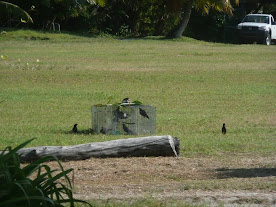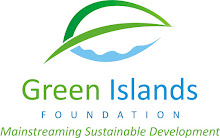As mentioned in my post of 8th June arrangements had been made for some researchers from Groningen University in the Netherlands to come to Denis to undertake a study of the Seychelles warbler (Acrocephalus sechellensis). The Seychelles warbler was introduced to Denis in 2004 as part of its ongoing national conservation plan (see post of 08/06 for more info).
The researchers Jildou and Peter arrived three weeks ago and were straight into their work. The establishment of a new population on an island offers plenty of scope for research. Jildou and Peter will be investigating the warbler’s population growth since 2007 and undertaking a detailed survey to ascertain survival and reproductive success in the population. Jildou and Peter are working under the supervision of Dr Jan Komdeur who worked in Seychelles for several years in the late 1980’s and early 1990’s. Jan was the man responsible for the propagation of the warbler to other islands that has done so much to enhance the conservation status of this endemic species. His detailed research of the warbler and its habitat requirements enabled the transfer of birds from the then sole colony on Cousin island to the islands of Aride and Cousine and latterly Denis.
Jildou and Peter are looking in particular at female mortality. There is evidence from the previous Denis survey in 2007 that the warbler population was skewed, with more males than females. Birds on a new island with abundant vacant habitat undergo more rapid reproduction than they do in established populations simply because resources are more abundant. Breeding is an energy intensive activity particularly for the females. It is postulated that this investment by the females may detract from their longevity and hence the development of a skewed sex ratio in the population.
Jildou and Peter will therefore be monitoring levels of stress in the birds by taking blood samples and checking for levels of oxidative stress, they will also be looking at the level of stress hormones in warbler faecal samples. They are furthermore looking at the levels of immunocompetence in the birds by assessing a variety of physical characteristics of the birds – as stress can affect immunocompetence.
This research is very interesting and has various ramifications for the planning of bird translocations in the future. From a Denis viewpoint, we are particularly interested in an update on the status of the population, its distribution and habitat use as this will help inform decision-making with regard to vegetation management on the island.
Keep checking back for more updates on Jildou and Peter’s endeavours.
Subscribe to:
Post Comments (Atom)

























No comments:
Post a Comment